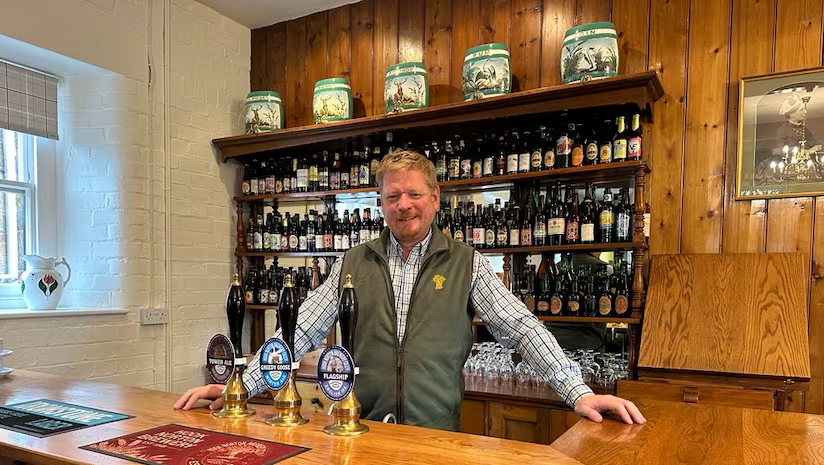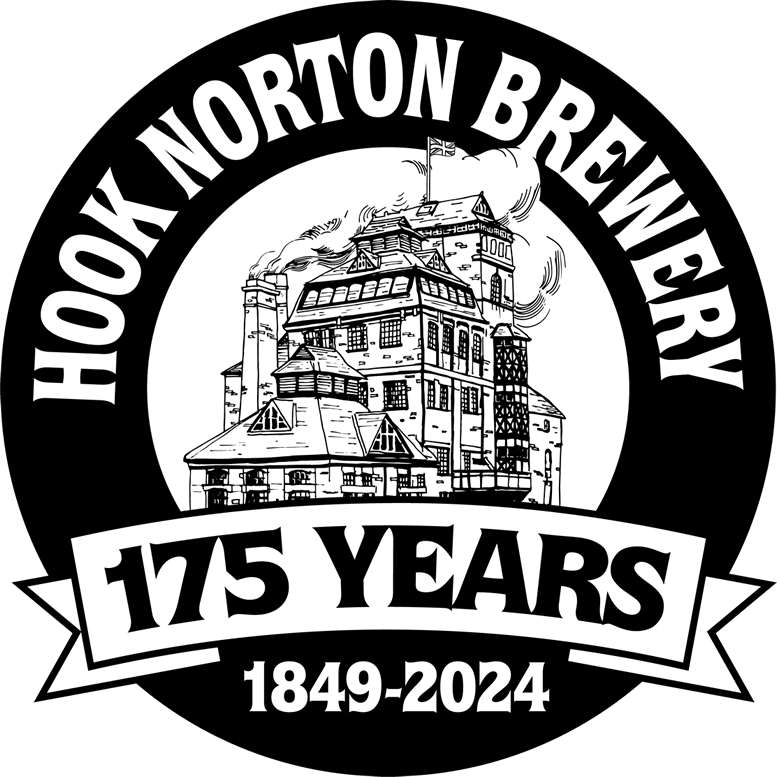
Morning Advertiser – The Big Interview with James Clarke
We can’t change the past, but we can invest in people to inspire the next generation and shape the future. That’s what Hook Norton’s fifth generation managing director James Clarke told The Morning Advertiser (The MA) when we caught up with him for the Big Interview.
Hook Norton brewery was founded in 1849 by Clarke’s two-times great grandfather, John Harris, who purchased 52 acres of farmland, including a malthouse. Today, the brewery is known for its five-strong core range of beers, including its flagship brew Old Hooky, a 4.6% ABV best bitter. While the brewery may be steeped in tradition, including its famous shire horses that still deliver to local pubs in the summer months, the business is firmly looking forward.
Clarke said: “We can’t turn the clock back or change the past, but we can shape the future.” However, the managing director urged the pressure from running a family business means people should only take the reins for the “right reasons”.
“As generations go on, there’s more pressure on the next one, but you mustn’t let that pressure be the drive as to whether a successive generation wants to be involved or not. “We’ve got about a hundred direct employees and then there’s three dozen pubs. There are quite a few livelihoods depending on this business, so you have got to make the right decisions. “As you get a bit older, families say there’s an opportunity, but you’ve got to be committed and want to do it and for the right reasons, which I did.”
Clarke, who grew up in Hook Norton, explained he had an interest in the brewery from a young age, adding all the “sights, smells and sounds” were exciting to him as a “youngster”. Having worked at the brewery during summer holidays, Clarke started his career on the production side of the business in April 1991, after finishing his A Levels and gaining work experience in the Channel Islands. However, he soon found his passion was on the microbiological side of the firm and introduced a lab to help improve the quality of Hook Norton’s beer. The lab is still in place and monitors hygiene practices at the brewery, testing the plant for cleanliness and the yeast handling to make sure there are no infections present in the beer. “We are in quite an old building with lots of open vessels. The layout was fantastic in 1899 when tower breweries were in their heyday, but it probably wouldn’t be designed like that these days. “So, it’s about working within that whole environment to maintain quality assurance and control.”
The now managing director was then appointed as head brewer in 1998 and took over the business in September 2004 at the age of 33, upon the death of his father, in-keeping with family firm’s tradition. However, he did not have the smoothest induction into leadership. Three months after his father sadly passed away Clarke also lost a valued colleague as one of the long-standing non-executives of the business also passed away, which meant the firm “lost a lot of experience in a very short period of time”. “The three of us were the only cheque signatures and then all of a sudden, there’s only one and that caused some technical challenges and procedural issues. “Then came the realisation there was quite a lot resting on my shoulders. Luckily, I had some very supportive non execs. “We’re a relatively small business, but it’s been going for a long time and there is a responsibility to endeavour to maintain that. “My boss in Jersey always said, ‘the day I wake up and really don’t want to come to work is the day I’ll give my notice in’ – and he was absolutely right.”
Reflecting on the start of his career, Clarke described the mid-90s as “halcyon days” for cask ale, adding one of his proudest moments came in 1998 when Hook Norton won the International Cask Ale Trophy for its bitter. “Cask was having quite a renaissance then. We were only really brewing three different beers at that time, which were a mild, a bitter and Old Hooky; life was quite rosy.”
Though the landscape for both pubs and breweries has changed “dramatically” since then, he added, which has made development and quality control in cask more important. “Nearly 90% of beer consumed in the UK was drunk in pubs when I started; we’ve seen that demographic shift massively since then. “Back then, we didn’t have the internet, we had four channels on the television and if you wanted a plumber or an electrician, you found out where they drank, went to that pub and said I’ve got a job for you. Now, people just Google everything. “The pub is a big communication facilitator and that’s been replaced by electronic communications, partly due to the impact Covid had, which was painful.”
On Covid, the managing director added while the pandemic was “not a highlight”, getting through it was an “achievement”. For Clarke, patience and flexibility were paramount for any business leader, which was made clearer than ever for him during the pandemic. “Sometimes I’m too patient and it does annoy other people, but I really think patience is a virtue. “Sometimes things happen and when you’re trying to resolve a problem, you can resolve it very quickly with risk or you can be more patient and let things take their course, as long as it doesn’t cause too many commercial challenges.”
In addition, personability and having time for people were also key for the managing director, in particular when it comes to looking after people’s mental health. “Talking about metal health, particularly for men, is coming more to the fore, which is a good thing, we’re always trying to support each other [at Hook Norton]. “It’s nice to know that support is there but overall, we’ve got to accept the fact that we all have an emotional reservoir and when it’s full, it’s going to overflow. “[Hospitality] is a people business. I’m not the most outgoing person, maybe more so after a couple of pints, but we’ve got to remember this is a people business. “If we lose that, then we’ll all just sit at home and drink on our own and watch Netflix. That’s why we still have a full field sales team going around calling on people.”
Moreover, Clarke said asking for help was a “strength not a weakness”. “It’s a sign of strength because you know your limitations and you can ask for support. “You need help to pick up areas where you’re less strong and make sure you’ve got the right people in those parts of the business.” However, the “commercial vein” must run through all of this, something that is even more prevalent when looking to preserve a legacy, Clarke added. “You need to help people, absolutely, but not lose sight of the commercial bit and that you are here to be successful, pay the bills and employ people. “If you don’t make money, you haven’t got anything to invest either and that’s very important so we can secure our future and keep innovating – with a family business you tend to have the longer-term view and take the rough with the smooth.”
While the managing director said he finds balancing family life “challenging” at times as the job can be “all consuming”, he added it’s really important to take time off. To help relax and switch off, Clarke shared he likes to jump on his Triumph Tiger 1050 motorbike, ride one of the brewery’s famed shire horses or garden. However, the managing director added there was “always a beer involved”.
“Beer is very much the life. I recently rode down to a hop farm, picked some green hops and hops that weren’t dried, rode back the brewery and put them straight in the microbrewery, which was fun. “I enjoy riding the brewery’s shire horses from time to time as well. It’s lovely because once you’re on that horse, you’ve got to focus on that.”
In addition, the brewery has been “committed” to supporting humanitarian aid since Russia invaded Ukraine, something Clarke said has taken up “most of his spare time”. As well as supporting humanitarian efforts in Ukraine, Clarke also volunteers for the local ambulance service a first responder and worked as an on-call firefighter from 1991 to 2005. “It’s very full on but it’s all quite inextricably linked with the village fabric as well. “We’re in a village where there’s a lot going on. There’s lots of organisations with a big charity focus and the brewery plays a fairly central part in in a lot of that.”
This charitable and people-focused ethos is something that has run through the business and for Clarke personally for decades. Clarke spoke fondly of his predecessors in this vein, particularly of his grandfather, who passed away when he was around 11 years old. “When he retired, it was back in the days when he used to go around the pubs and collect the rent cheque every week. “He’d go into Chipping Norton, and everybody knew his timings, so there’d be a load of old boys sat in the bar because he’d buy them a drink and collect the cheque. “Then he’d go onto the next pub and all the same old boys would be sat there because they knew he’d buy them another pint. But that was marketing 50 years ago.”
Clarke has carried on his ancestors progressive yet laid back approach to management at Hook Norton, in particular when it comes to new ideas for the brewery. “When people mention the word lager, I say ‘did you hear that bump? I think that might be dad or grandfather turning in their grave’. “But they wouldn’t have held back on that. You’ve got to do what’s right at the time with the market and the opportunity you’re presented with.
“It’s not necessarily our generation that benefits from a paternalistic approach, but, as with people before us, it is one long succession of people and we had to give back to the company to see it through tough times. “Money and remuneration are important, but it’s not all about that, it’s looking after people. Everybody has times that are less good where we can try and look after them. “We need to respect people and their decisions and accept the fact that everybody’s different try and get to know their idiosyncrasies and motivates people.”
When it comes to inspiring the next generation, Clarke hopes his children will bring experience in new areas to Hook Norton. The managing director has four sons, two of whom currently work at the brewery having gained experience at other firms, including Gipsy Hill. “They’re very crafty, very keg orientated. Hopefully they’ll bring some of that experience back to our keg range and improve that. “It’s an area where our knowledge and experience is much less than the cask – cask is in our veins.”
Clarke added most of the pressure within his role has come from the “tough commercial environment” in recent years, including “horrific energy costs” and other global issues. “You can go in a pub and it’s busy, the beer can be fantastic, and the food is great. The standards in hospitality really have improved, but it’s becoming ever more challenging commercially. “I grew up in the shadow of RAF Upper Heyford, which was used as by the United States as an Air Force Base that flew F111 fighter bombers as part of our Cold War deterrent. “Back then, you’d hear a lot of planes and they’d be quite loud, but if I woke my parents they’d say, well, that’s the sound of freedom, go back to sleep. “Now the world’s probably more unstable than it was then and that’s having its impact on businesses.”


